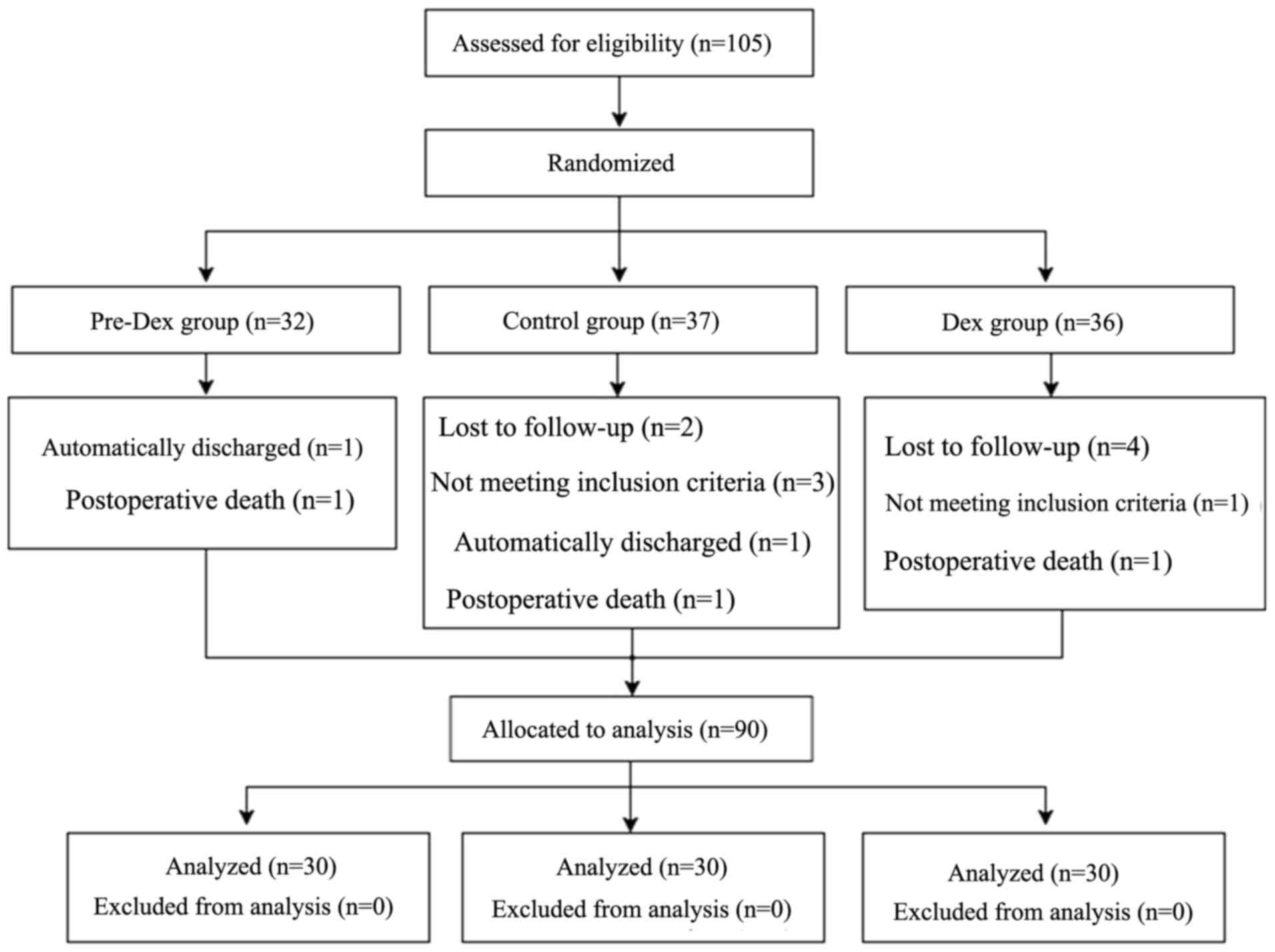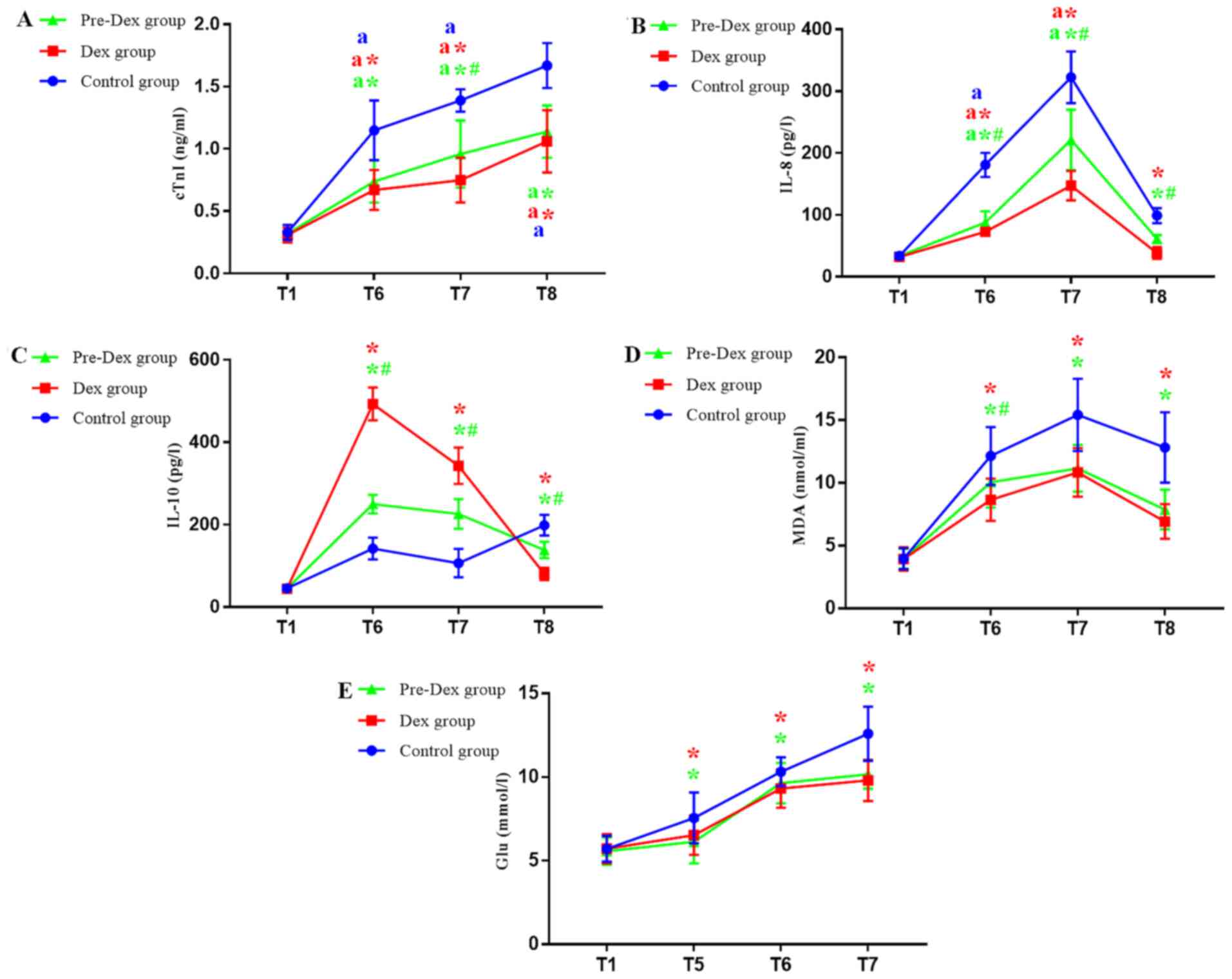|
1
|
Li M, Xu S, Geng Y, Sun L, Wang R, Yan Y,
Wang H, Li Y, Yi Q, Zhang Y, et al: The protective effects of
L-carnitine on myocardial ischaemia-reperfusion injury in patients
with rheumatic valvular heart disease undergoing CPB surgery are
associated with the suppression of NF-KB pathway and the activation
of Nrf2 pathway. Clin Exp Pharmacol Physiol. 46:1001–1012.
2019.PubMed/NCBI View Article : Google Scholar
|
|
2
|
Murry CE, Jennings RB and Reimer KA:
Preconditioning with ischemia: A delay of lethal cell injury in
ischemic myocardium. Circulation. 74:1124–1136. 1986.PubMed/NCBI View Article : Google Scholar
|
|
3
|
Karwi QG, Bice JS and Baxter GF: Pre- and
postconditioning the heart with hydrogen sulfide (H2S) against
ischemia/reperfusion injury in vivo: A systematic review and
meta-analysis. Basic Res Cardiol. 113(6)2017.PubMed/NCBI View Article : Google Scholar
|
|
4
|
Cope DK, Impastato WK, Cohen MV and Downey
JM: Volatile anesthetics protect the ischemic rabbit myocardium
from infarction. Anesthesiology. 86:699–709. 1997.PubMed/NCBI View Article : Google Scholar
|
|
5
|
Wang K, Wu M, Xu J, Wu C, Zhang B, Wang G
and Ma D: Effects of dexmedetomidine on perioperative stress,
inflammation, and immune function: Systematic review and
meta-analysis. Br J Anaesth. 123:777–794. 2019.PubMed/NCBI View Article : Google Scholar
|
|
6
|
Sheikh TA, Dar BA, Akhter N and Ahmad N: A
Comparative study evaluating effects of intravenous sedation by
dexmedetomidine and propofol on patient hemodynamics and
postoperative outcomes in cardiac surgery. Anesth Essays Res.
12:555–560. 2018.PubMed/NCBI View Article : Google Scholar
|
|
7
|
Riquelme JA, Westermeier F, Hall AR,
Vicencio JM, Pedrozo Z, Ibacache M, Fuenzalida B, Sobrevia L,
Davidson SM, Yellon DM, et al: Dexmedetomidine protects the heart
against ischemia-reperfusion injury by an endothelial eNOS/NO
dependent mechanism. Pharmacol Res. 103:318–327. 2016.PubMed/NCBI View Article : Google Scholar
|
|
8
|
Zhang JJ, Peng K, Zhang J, Meng XW and Ji
FH: Dexmedetomidine preconditioning may attenuate myocardial
ischemia/reperfusion injury by down-regulating the
HMGB1-TLR4-MyD88-NF-KB signaling pathway. PLoS One.
12(e0172006)2017.PubMed/NCBI View Article : Google Scholar
|
|
9
|
Ren J, Li C, Liu Y, Liu H and Dong Z:
Protective effect of dexmedetomidine against myocardial
ischemia-reperfusion injury in rabbits. Acta Cir Bras. 33:22–30.
2018.PubMed/NCBI View Article : Google Scholar
|
|
10
|
Ammar AS, Mahmoud KM, Kasemy ZA and Helwa
MA: Cardiac and renal protective effects of dexmedetomidine in
cardiac surgeries: A randomized controlled trial. Saudi J Anaesth.
10:395–401. 2016.PubMed/NCBI View Article : Google Scholar
|
|
11
|
Dripps RD: New classification of physical
status. Anesthesiology. 24(111)1963.PubMed/NCBI
|
|
12
|
Caraballo C, Desai NR, Mulder H, Alhanti
B, Wilson FP, Fiuzat M, Felker GM, Piña IL, O'Connor CM, Lindenfeld
J, et al: Clinical implications of the New York heart Association
Classification. J Am Heart Assoc. 8(e014240)2019.PubMed/NCBI View Article : Google Scholar
|
|
13
|
Xiong W, Qu Y, Chen H and Qian J: Insight
into long noncoding RNA-miRNA-mRNA axes in myocardial
ischemia-reperfusion injury: The implications for mechanism and
therapy. Epigenomics. 11:1733–1748. 2019.PubMed/NCBI View Article : Google Scholar
|
|
14
|
Shen Y, Liu X, Shi J and Wu X: Involvement
of Nrf2 in myocardial ischemia and reperfusion injury. Int J Biol
Macromol. 125:496–502. 2019.PubMed/NCBI View Article : Google Scholar
|
|
15
|
Ma C, Xu Z and Lv H: Low n-6/n-3 PUFA
ratio improves inflammation and myocardial ischemic reperfusion
injury. Biochem Cell Biol. 97:621–629. 2019.PubMed/NCBI View Article : Google Scholar
|
|
16
|
Al-Fares A, Pettenuzzo T and Del Sorbo L:
Extracorporeal life support and systemic inflammation. Intensive
Care Med Exp. 7 (Suppl 1)(S46)2019.PubMed/NCBI View Article : Google Scholar
|
|
17
|
Natanov R, Gueler F, Falk CS, Kühn C, Maus
U, Boyle EC, Siemeni T, Knoefel AK, Cebotari S, Haverich A and
Madrahimov N: Blood cytokine expression correlates with early
multi-organ damage in a mouse model of moderate hypothermia with
circulatory arrest using cardiopulmonary bypass. PLoS One.
13(e0205437)2018.PubMed/NCBI View Article : Google Scholar
|
|
18
|
O'Neill S, Ross JA, Wigmore SJ and
Harrison EM: The role of heat shock protein 90 in modulating
ischemia-reperfusion injury in the kidney. Expert Opin Investig
Drugs. 21:1535–1548. 2012.PubMed/NCBI View Article : Google Scholar
|
|
19
|
Mebazaa A, Pitsis AA, Rudiger A, Toller W,
Longrois D, Ricksten SE, Bobek I, De Hert S, Wieselthaler G,
Schirmer U, et al: Clinical review: Practical recommendations on
the management of perioperative heart failure in cardiac surgery.
Crit Care. 14(201)2010.PubMed/NCBI View
Article : Google Scholar
|
|
20
|
Zhang J, Jiang H, Liu DH and Wang GN:
Effects of dexmedetomidine on myocardial ischemia-reperfusion
injury through PI3K-Akt-mTOR signaling pathway. Eur Rev Med
Pharmacol Sci. 23:6736–6743. 2019.PubMed/NCBI View Article : Google Scholar
|
|
21
|
Yu J, Yang W, Wang W, Wang Z, Pu Y, Chen
H, Wang F and Qian J: Involvement of miR-665 in protection effect
of dexmedetomidine against oxidative stress injury in myocardial
cells via CB2 and CK1. Biomed Pharmacother.
115(108894)2019.PubMed/NCBI View Article : Google Scholar
|
|
22
|
Xu Z, Wang D, Zhou Z, Chen Q, Zhang D,
Chen S, Jiang H, Jia C and Liu X: Dexmedetomidine attenuates renal
and myocardial ischemia/reperfusion injury in a dose-dependent
manner by inhibiting inflammatory response. Ann Clin Lab Sci.
49:31–35. 2019.PubMed/NCBI
|
|
23
|
Vijayan NK, Talwar V and Dayal M:
Comparative evaluation of the effects of pregabalin,
dexmedetomidine, and their combination on the hemodynamic response
and anesthetic requirements in patients undergoing laparoscopic
cholecystectomy: A randomized double-blind prospective study.
Anesth Essays Res. 13:515–521. 2019.PubMed/NCBI View Article : Google Scholar
|
|
24
|
Ye W, Hu Y, Wu Y, Zhu Z, Jin X and Hu Z:
Retrobulbar dexmedetomidine in pediatric vitreoretinal surgery
eliminates the need for intraoperative fentanyl and postoperative
analgesia: A randomized controlled study. Indian J Ophthalmol.
67:922–927. 2019.PubMed/NCBI View Article : Google Scholar
|
|
25
|
Kehlet H: Multimodal approach to control
postoperative pathophysiology and rehabilitation. Br J Anaesth.
78:606–617. 1997.PubMed/NCBI View Article : Google Scholar
|
|
26
|
Hanada S, Kurosawa A, Randall B, Van Der
Horst T and Ueda K: Impact of high spinal anesthesia technique on
fast-track strategy in cardiac surgery: Retrospective study. Reg
Anesth Pain Med: Nov 25, 2019 doi: 10.1136/rapm-2018-100213 (Epub
ahead of print).
|
|
27
|
Zientara A, Mariotti S, Matter-Ensner S,
Seifert B, Graves K, Dzemali O and Genoni M: Fast-track management
in off-pump coronary artery bypass grafting: Dexmedetomidine
provides rapid extubation and effective pain modulation. Thorac
Cardiovasc Surg. 67:450–457. 2019.PubMed/NCBI View Article : Google Scholar
|
|
28
|
Kim SH and Choi YS: Effects of
dexmedetomidine on malondialdehyde and proinflammatory cytokines
after tourniquet-induced ischemia-reperfusion injury in total knee
arthroplasty. Minerva Anestesiol. 86:223–224. 2020.PubMed/NCBI View Article : Google Scholar
|
|
29
|
Zhang J, Xia F, Zhao H, Peng K, Liu H,
Meng X, Chen C and Ji F: Dexmedetomidine-induced cardioprotection
is mediated by inhibition of high mobility group box-1 and the
cholinergic anti-inflammatory pathway in myocardial
ischemia-reperfusion injury. PLoS One. 14(e0218726)2019.PubMed/NCBI View Article : Google Scholar
|
|
30
|
Papp A, Uusaro A, Parviainen I,
Hartikainen J and Ruokonen E: Myocardial function and haemodynamics
in extensive burn trauma: Evaluation by clinical signs, invasive
monitoring, echocardiography and cytokine concentrations. A
prospective clinical study. Acta Anaesthesiol Scand. 47:1257–1263.
2003.PubMed/NCBI View Article : Google Scholar
|
|
31
|
Vaz HA, Guimaraes RB and Dutra O:
Challenges in high-sensitive troponin assay interpretation for
intensive therapy. Rev Bras Ter Intensiva. 31:93–105.
2019.PubMed/NCBI View Article : Google Scholar : (In Portuguese,
En).
|
|
32
|
Yu Z, Zhang P, Wang H, Zhang L, Wei W,
Fang W and Mu X: Effects of dexmedetomidine versus remifentanil on
mothers and neonates during cesarean section under general
anesthesia. Biomed Pap Med Fac Univ Palacky Olomouc Czech Repub.
164:417–424. 2020.PubMed/NCBI View Article : Google Scholar
|
|
33
|
Kundra TS, Thimmarayappa A, Dhananjaya M
and Manjunatha N: Dexmedetomidine for prevention of skeletal muscle
ischaemia-reperfusion injury in patients with chronic limb
ischaemia undergoing aortobifemoral bypass surgery: A prospective
double-blind randomized controlled study. Ann Card Anaesth.
21:22–25. 2018.PubMed/NCBI View Article : Google Scholar
|
|
34
|
Kundra TS, Nagaraja PS, Singh NG,
Dhananjaya M, Sathish N and Manjunatha N: Effect of dexmedetomidine
on diseased coronary vessel diameter and myocardial protection in
percutaneous coronary interventional patients. Ann Card Anaesth.
19:394–398. 2016.PubMed/NCBI View Article : Google Scholar
|
|
35
|
Peng K, Qiu Y, Li J, Zhang ZC and Ji FH:
Dexmedetomidine attenuates hypoxia/reoxygenation injury in primary
neonatal rat cardiomyocytes. Exp Ther Med. 14:689–695.
2017.PubMed/NCBI View Article : Google Scholar
|
|
36
|
Hashemian M, Ahmadinejad M, Mohajerani SA
and Mirkheshti A: Impact of dexmedetomidine on hemodynamic changes
during and after coronary artery bypass grafting. Ann Card Anaesth.
20:152–157. 2017.PubMed/NCBI View Article : Google Scholar
|
|
37
|
Duncan D, Sankar A, Beattie WS and
Wijeysundera DN: Alpha-2 adrenergic agonists for the prevention of
cardiac complications among adults undergoing surgery. Cochrane
Database Syst Rev. 3(CD004126)2018.PubMed/NCBI View Article : Google Scholar
|
|
38
|
Yeang C, Hasanally D, Que X, Hung MY,
Stamenkovic A, Chan D, Chaudhary R, Margulets V, Edel AL, Hoshijima
M, et al: Reduction of myocardial ischaemia-reperfusion injury by
inactivating oxidized phospholipids. Cardiovasc Res. 115:179–189.
2019.PubMed/NCBI View Article : Google Scholar
|
|
39
|
Kuznetsov AV, Javadov S, Margreiter R,
Grimm M, Hagenbuchner J and Ausserlechner MJ: The role of
mitochondria in the mechanisms of cardiac ischemia-reperfusion
injury. Antioxidants (Basel). 8(454)2019.PubMed/NCBI View Article : Google Scholar
|
|
40
|
Xu X, Rui S, Chen C, Zhang G, Li Z, Wang
J, Luo Y, Zhu H and Ma X: Protective effects of astragalus
polysaccharide nanoparticles on septic cardiac dysfunction through
inhibition of TLR4/NF-KB signaling pathway. Int J Biol Macromol.
153:977–985. 2020.PubMed/NCBI View Article : Google Scholar
|
|
41
|
Zhang DS, Liang GY, Liu DX, Yu J and Wang
F: Role of phosphorylated AMP-activated protein kinase (AMPK) in
myocardial insulin resistance after myocardial ischemia-reperfusion
during cardiopulmonary bypass surgery in dogs. Med Sci Monit.
25:4149–4158. 2019.PubMed/NCBI View Article : Google Scholar
|


















